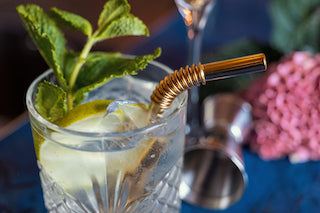
Plastic straws, coffee to-go cups, Styrofoam packaging, etc. – plastic waste is now one of the number one environmental problems. Disposable straws and plastic toothbrushes that wash up on beaches are already polluting the world's oceans and carelessly disposed of food packaging and plastic bottles are causing irreparable damage to the world Nature. Plastic-free living can be so easy. We have put together 7 great tips and tricks for you to help you make your everyday life plastic-free.
Tip 1: Jute bag instead of plastic bag
Using fabric or jute bags when shopping saves around a million plastic bags every year, which sooner or later end up in the environment. So before you go shopping, remember to pack enough reusable bags in addition to your shopping list to safely transport your purchases home. Our tip: put some reusable shopping bags in your car. This way, if in doubt, you don't have to grab a plastic bag at the checkout when you spontaneously do your weekly shopping after work.
Tip 2: Reusable straw instead of disposable straw
Around 40 million plastic straws are used in Germany every year, making up a significant proportion of the plastic waste that washes up on beaches. And who doesn't remember the video of the turtle having a plastic straw removed from its nose? Instead of a plastic straw, just use the turtleneck
Plastic straws, coffee to-go cups, Styrofoam packaging, etc. – plastic waste is now one of the number one environmental problems. Disposable straws and plastic toothbrushes that wash up on beaches are already polluting the world's oceans and carelessly disposed of food packaging and plastic bottles are causing irreparable damage to the world Nature. Plastic-free living can be so easy. We have put together 7 great tips and tricks for you to help you make your everyday life plastic-free.
Tip 1: Jute bag instead of plastic bag
Using fabric or jute bags when shopping saves around 1 million plastic bags every year, which sooner or later end up in the environment. So before you go shopping, remember to pack enough reusable bags in addition to your shopping list to safely transport your purchases home. Our tip: leave some reusable shopping bags in your car. This way, if in doubt, you don't have to grab a plastic bag at the checkout when you spontaneously do your weekly shopping after work.
Tip 2: Reusable straw instead of disposable straw
Around 40 million plastic straws are used in Germany every year, making up a significant proportion of the plastic waste that washes up on beaches. And who doesn't remember the video of the turtle having a plastic straw removed from its nose? Instead of a plastic straw, just use the Turtleneck ® Straw. It is flexible, stable, tasteless and is in no way inferior to the original. And it is guaranteed to be plastic-free and also looks good with its elegant design!
Tip 3: Reusable alternatives instead of single-use plastic
They are part of everyday life like plastic straws are part of cocktails. CoffeeToGo cups and food packaging made of Styrofoam, as well as disposable bags for fruit and vegetables, are an indispensable part of the catering and retail sectors - and pollute the environment millions of times over. To save tons of avoidable single-use plastic, just think of reusable coffee cups, cutlery, fruit and vegetable bags and lunch boxes for your lunch break. This way you are doing good for the environment and can also transport your food or shopping home safely and plastic-free.
Tip 4: Loose goods instead of packaged quantities
Buying packaged fruit and vegetables, rice and pasta is of course practical and is often perceived as more hygienic. However, there is always a huge amount of plastic waste that clogs the garbage can at home. Therefore, when shopping, make sure to buy loose goods that you can transport home in reusable fruit and vegetable bags. This way you save plastic waste and only buy the quantities you really need. Our tip: If you want to buy rice, pasta, etc. plastic-free, you should stop by an unpackaged store. Many products are available there for self-filling. Simply bring a Tupperware container with you from home and have it filled with the products you want.
Tip 5: Bamboo toothbrush instead of a plastic alternative
Along with plastic straws, plastic toothbrushes are one of the types of single-use plastic that most often wash up on beaches. Instead, simply use sustainable toothbrushes made of wood and biodegradable organic plastic and bamboo charcoal to brush your teeth. This will make your teeth just as white and clean as with a plastic toothbrush and you will save tons of plastic waste.
Tip 6: Glass bottle instead of plastic
Admittedly, plastic bottles are practical. They are easier to carry, flexible, stable and can easily be disposed of via the deposit machine. And as disposable bottles, they are usually not recycled and sooner or later end up in the environment. Therefore, when shopping, it is better to use glass bottles instead of plastic bottles. This saves huge amounts of avoidable plastic waste and ensures that the bottle does not release any microplastics into your drink. And if you don't want to lug glass bottles home, you can simply order them from a drinks retailer and have them delivered. You can safely do without plastic bottles when you're on the go: reusable stainless steel bottles are just as light as a plastic bottle and can be refilled again and again at the tap.
Tip 7: Solid shampoo instead of liquid products
Liquid soaps are practical, foam well and give you the feeling of getting really clean. And they usually come with a lot of plastic that sooner or later ends up in nature. Instead, just use solid soaps for your hair, face and body. Even if washing them is a bit strange at first, these products are guaranteed not to contain any plastic and are usually vegan and cruelty-free. In this way, you avoid plastic packaging as well as microplastics on your skin and also make a contribution to animal welfare.


